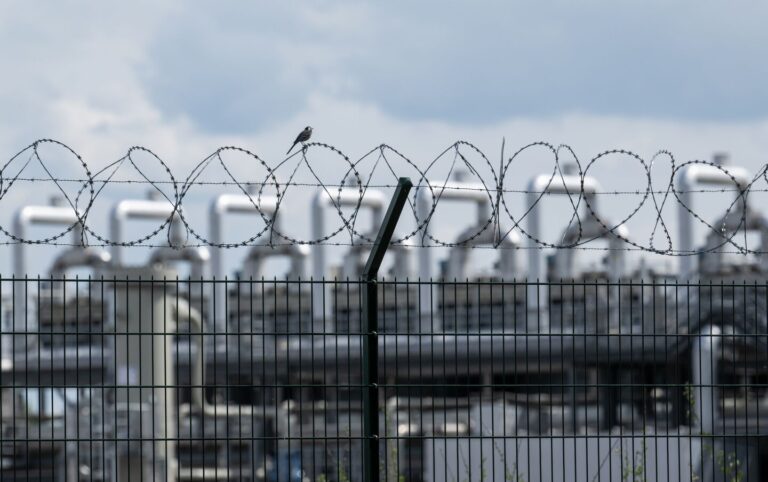A ship carrying Ukraine Peoples exports left the country for the first time since the war began on Monday.
The sight, which was a common occurrence before Russia invaded back in February, has sparked hope there could be an end in sight for the food crisis gripping countries across the world.
Here’s everything you need to know.
What is everyone saying about the photo?
The image of the Sierra Leone-flagged Ukrainian vessel, the Razoni, leaving the country to dock at the port of Tripoli in Lebanon with 26 tonnes of corn has been hailed as a sign of progress.
Ukraine’s minister of foreign affairs, Dmytro Kuleba, has praised it as a “day of relief for the world” as it is the first ship to leave the bay, and the country’s infrastructure minister Alexander Kubrakov has confirmed that there are 16 more ships waiting to leave the region, too.
The Kremlin has also praised the deal, telling reporters that the ship’s departure was a “very positive” development.
Why is Ukrainian grain so important?
Ukraine has a reputation for being the “breadbasket” of Europe, providing one third of the global grain exports together with Russia. Ukraine alone provides food for Egypt, Indonesia, Bangladesh, Turkey and Yemen, just to name a few.
This essential trade was cut off by the Russian Armed Forces earlier this year when they barricaded Ukrainian ports, meaning around 20 million tonnes of grain meant to be exported were trapped in the country.
Ukrainian president Volodymyr Zelensky had previously warned that this could increase to 75 million tonnes after this year’s harvest if no action was taken to open up the ports once again.
The blockade also meant food prices around the world for items such as pasta or bread became more expensive, contributing to both global inflation and poverty.
Ukraine also accounted for 16% of the world’s corn supplies and 42% of sunflower oil in 2019. Unsurprisingly, the Russian blockade therefore meant cooking oils and fertilisers soared in price this year as well.
If more ships can export grain – along with corn, fertiliser and sunflower oil – from both Russia and Ukraine, then there’s a chance these negative impacts will subside.
After all, when news of the deal broke, there was an immediate 5% drop in wheat prices.
As foreign secretary Liz Truss said: “This is an important first step. The UK and our allies have pushed hard for this outcome.”
Yet, she added: “The only way Putin can truly alleviate the global food security crisis he has created is by ending his brutal invasion of Ukraine.”
What was in the agreement?
Russia and Ukraine were able to reach a deal over the grain shipments last month.
The agreement was brokered by both the UN and Turkey, and took two months to come to a form of compromise. It’s set to last for 120 days, but can be renewed as long as both Russia and Ukraine agree to it.
Russia has promised not to target ports when shipments are in transit. In return, Ukraine agreed that its naval vessels will guild the ships through the mined waters.
Turkey and the UN will then inspect these ships, so Moscow does not fear that weapons are being smuggled.
The agreement, known as the Istanbul grain initiative, means there will be safe access through a maritime corridor to Odesa, Chornomorsk and Pivdennyi ports for these ships.
All parties have promised not to attack merchant or other civilian vessels, or port facilities covered by the plan as well.
If the operation continues, there’s a chance Ukraine’s economy could bounce back and the millions who rely on the Ukrainian grain will benefit.
However, not everyone is convinced that the plan is enough.
Veteran commodities analyst Darin Newsom told Foreign Policy magazine: “I don’t think it’s going to solve the global tightness in a lot of these grain markets.
“I think the markets are going to stay very volatile, and we’re going to have to continue to deal with this until the bigger problem of Russia’s invasion of Ukraine is solved.”
What does this mean for the war?
While this is definitely positive news for the international community, as it is essentially a ceasefire at sea, but Ukraine is still suffering under Russia’s invasion and Moscow has no intention of stopping.
Kyiv issued its first mass evacuation order over the weekend, calling for all Ukrainians in the Donbas region to leave after Russia’s attacks grew more intense.
“The sooner it is done, the more people leave Donetsk region now, the fewer people the Russian army will have time to kill,” Zelensky said.
He added: “At this stage of the war, terror is the main weapon of Russia.”
There’s also not much trust between officials in Kyiv and Moscow, especially after Russia launched missiles at Odesa port less than a day after the deal was first announced.
Although Zelensky warned that this showed Moscow could not be trusted and that it struck port infrastructure, Russia allegedly that the strike was meant for the Ukrainian naval ship at the port.
Odesa MP Oleksiy Goncharenko told the BBC: “We see these awful missile attacks against Odesa in the last days – that is just their attempts to increase the risks for ship owners, for crew, not to come to Odesa.”
Continued fighting could put the grain deal at risk too.
Volodymyr Sidenko, expert with the Kyiv-based Razumkov Centre think tank, told AP news agency: “The danger remains: The Odesa region has faced constant shelling and only regular supplies could prove the viability of the agreements signed.
“The departure of the first vessel doesn’t solve the food crisis, it’s just the first step that could also be the last if Russia decides to continue attacks in the south.”

